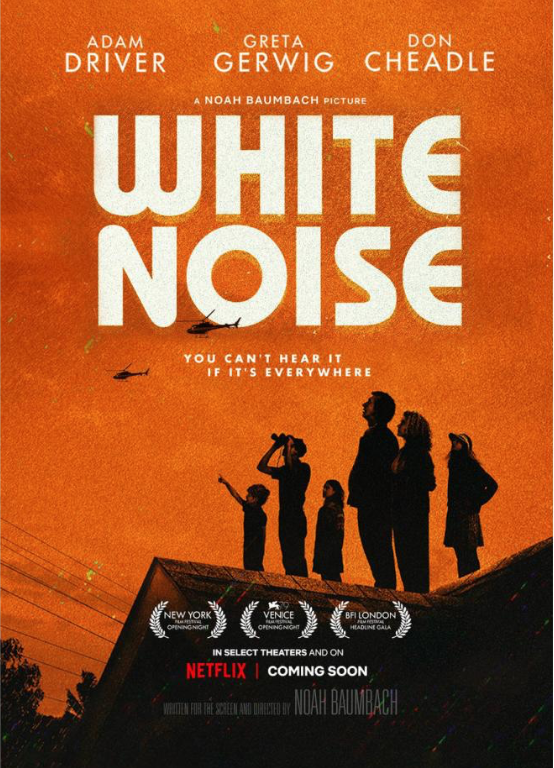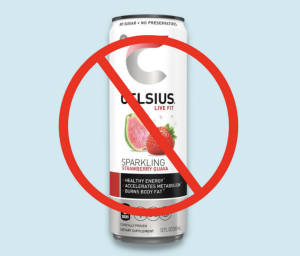Cale’s cinema critiques: “White Noise”
Did a movie predict the East Palestine train derailment?
February 28, 2023
When I made the 45-minute drive from my middle-of-nowhere hometown, Loganville, Georgia, into the Atlanta Perimeter to see Noah Baumbach’s adaptation of Don DeLillo’s 1985 classic, “White Noise,” back in December, I could not have imagined real-life headlines mirroring the film’s farfetched plot. Yet, just two months later, here we are. The Norfolk Southern train derailment in East Palestine, Ohio — where sections of “White Noise” were filmed — has produced a plight on-par with “The Airborne Toxic Event,” the fulcrum of DeLillo’s timeless tale.
In its second act, a train hauling hazardous chemicals derails, forming a fuming cloud of noxious gas and forcing the residents of fictional town Blacksmith, Ohio, to evacuate. As the prospect of small-scale societal collapse looms large, DeLillo’s materialistic melancholia shifts from domestic despair to mobile mania.
Baumbach’s film follows Jack Gladney, played by Adam Driver, a professor of “Hitler studies” — an academic discipline he developed himself — at the College-on-the-Hill, an idyllic small-town university. His wife, Babette Gladney, played by Greta Gerwig, is a stay-at-home mother who spends her evenings leading a — wait for it — posture-correcting course for the elderly.
The peculiar details of the Gladneys’ day-to-day lives are just the tip of DeLillo’s absurdist iceberg. Each of the story’s characters speaks in ideas, not words and sentences. Every line of dialogue in Baumbach’s script is managed and overwritten, stamping out any semblance of human conversation. Driver and Gerwig’s performances are fueled by wacky, wide-eyed, capital-‘A’ acting. It is, essentially, two hours and change of Driver, Gerwig and Don Cheadle, who plays Murray Siskind, one of Jack’s fellow professors, bemoaning society’s commodification of every aspect of our lives.
For instance, the film’s final scene, which serves as its thesis statement, features the Gladneys — and, seemingly, every other family in Blacksmith — dancing up and down the aisles of the town’s supermarket. As “New Body Rhumba,” LCD Soundsystem’s — Oscar-nominated — original song plays, we see the store’s patrons fascinated by fresh fruit, filling carts with bland boxes of cookies and crackers, and walking, in single file, with impassioned strides.
I have been in the bag for Baumbach for a minute. His second-to-last feature film, 2019’s “Marriage Story,” is — probably — my favorite film from that year. I only say, “Probably,” because of Ari Aster’s “Midsommar.” Regardless, “Frances Ha” is one of my favorite films of all-time. Baumbach’s films often focus on aspirant east-coast creatives riddled with crippling neuroticism; the shoe fits. Although “White Noise” might, on first glance, appear to be a detour from his past projects, it is the manifestation of all of the feelings he has been after throughout his entire career — to the nth degree.
With those ideas comes some of the strongest filmmaking of his career. Baumbach has never been afforded a budget this big before. Even as a long-time fan, I did not know he had this — true-blue Spielbergian spectacle — in him. Some of the second-act set pieces he is able to put together — a scene involving a traffic jam in the aftermath of “The Airborne Toxic Event,” in particular — are breathtaking.
Yet, by the time the film hits the two-hour mark, what Baumbach is after — some sort of melding of the big-budget, candy-colored spectacle of ‘80s blockbuster filmmaking and an anxiety-fueled, heady confrontation of Reagan-era consumerism — starts to exceed his grasp. Its third act takes a hard left turn into nightmarish neo-noir — à la Paul Thomas Anderson’s “Inherent Vice,” which, in many ways, seems to be a sister film of “White Noise” — and the seams start to show a little bit. It starts to drift from a cohesive narrative to more of a psychedelic dreamscape for Baumbach’s — and, of course, DeLillo’s — fears of and frustrations with late-stage capitalism to roam without rein.
All in all, it might be a bit much for the poor soul who decides to fire up “White Noise” after seeing it showcased on the Netflix homepage. Actually, it definitely is; it has a Rotten Tomatoes Audience Score of — oh, yikes — 31%.
Nevertheless, despite all of the film’s messy, shaggy trappings, I found myself moved by the — rapidly — beating heart at its core. I have no idea how Baumbach managed to convince one of the biggest corporations in entertainment to give him $100 million to make it, but I am glad it happened.







